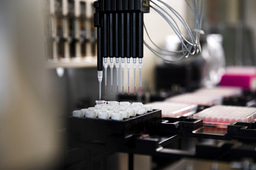Join our Editorial Board as Section Editor for Discover Developmental Biology
Published in Microbiology, Cell & Molecular Biology, and Plant Science

Discover Developmental Biology is a fully Open Access, peer-reviewed research journal that provides a platform for the rapid dissemination of multidisciplinary research across all fields of biological development relevant to animals, plants and microorganisms. Discover Developmental Biology is a new journal within the Discover portfolio, part of Springer Nature, and launched in January 2025.
Like other journals in the Discover portfolio, Discover Developmental Biology has been created with research community needs in mind. We provide a fast, reliable and inclusive publishing service while maintaining integrity at the heart of everything we do.



We now have Section Editor position available for Discover Developmental Biology, which is two-year contracted with an annual honorarium.
What will you do as a Section Editor at Discover Developmental Biology?
Section Editors are members of our academic leadership at the journal, and while the option to handle papers regularly is still available, and may be called upon for certain delayed or complex submissions, the focus of the role is on the development of the journal with an eye to the research community that it serves. Section Editors advise the publisher on key developments in their field, play an active role in the academic scope of the journal, engage in Editorial Board meetings and represent the journal to the community and their peers.
As a Section Editor, you will be asked to support the Journal by:
- Advising the publisher and the Board on aspects of journal development such as academic scope, diversity of our papers and editorial board, and standards within the field
- Supporting authors and the Journal by reinforcing an inclusive ethos: quality, integrity, relevance are essential for consideration - novelty and impact are nice to have, but not required
- Assessing manuscripts’ suitability for the journal: Is the paper in scope and scientifically suitable? Should it be sent to peer review?
- Making occasional editorial decisions on manuscripts after peer review, with a focus on manuscripts that have been delayed or complex cases; our publishing team can support completing the reviewer invitation and secure reports for you if you wish
- Being available to act as a reviewer on occasional manuscripts that require objective reports on quality, when members of the Editorial Board are unavailable or unsuitable for specific manuscripts
- Advocate for your journal within your community and network to increase awareness of publications, collections and other developments on the journal
- Inviting your peers to join the Discover community as editorial board members, guest editors, and authors
- Working with the publisher to maintain an active community of Senior Editorial Board Members
- Attracting submissions to the journal by inviting your peers to submit, or occasionally submitting your own work
- Attending and actively contributing to the Editorial Board meetings
- Engaging with our community outreach and discussions
Who are we looking for?
We are seeking candidates with excellent backgrounds in one of the research fields below:
- Plant developmental biology
- Development disorders
- Cell biology of development
- Microbial development
If you are an expert with a high research profile in one of these research fields, are active in your areas in recent years, have had editorial experiences, and are keen to support the growth and development for an open access journal, please do not hesitate to contact me (yao.guo@springernature.com) for applications and/or questions.
Please supply a most recent CV, highlighting any relevant publications and editorial experiences to the post, should you be interested in applying.
Look forward to hearing from you.
Follow the Topic
-
Discover Developmental Biology

Formerly Development Genes and Evolution, this journal is a fully open access, peer-reviewed journal supporting multidisciplinary research across all fields of biological development relevant to animals, plants and microorganisms.
Your space to connect: The Myeloid cell function and dysfunction Hub
A new Communities’ space to connect, collaborate, and explore research on Clinical Medicine and Cell Biology!
Continue reading announcementRelated Collections
With Collections, you can get published faster and increase your visibility.
Invertebrate Organs: Developmental Mechanism and Regenerative Medicine
The intricate dance of life, from a single fertilized egg to a complex organism, is orchestrated by a symphony of developmental mechanisms. Understanding these mechanisms, particularly in organ formation, is not only a fundamental pursuit in biology but also holds immense potential for regenerative medicine. The purpose of this collection is to shine a spotlight on the fascinating world of organogenesis, exploring the shared and unique strategies employed by diverse species to build their vital organs. This compilation of articles will serve as a valuable resource to promote innovation in the mechanisms of organ development in invertebrates.
Organ development is a complex and dynamic process that involves a myriad of genetic, molecular, cellular, and environmental factors. While invertebrates exhibit remarkable diversity in their body plans and organ systems, they often share conserved developmental pathways and regulatory networks. Although our knowledge of these aspects has progressed, much remains to be clarified about the relevant regulatory mechanisms. Based on integration of insights from model organisms and emerging non-model species, this collection provides a comprehensive perspective on the developmental mechanisms that shape invertebrate organs. It also encourages the translation of basic research findings into applications in regenerative medicine studies.
This collection brings together a collection of reviews and original research articles from leading experts in the field. We aim to provide a comprehensive overview of the current state of knowledge, highlight emerging trends, and spark new avenues of research in invertebrate organ development. Through unravelling the mysteries of how organs are built, we not only gain a deeper appreciation for the complexity of life but also pave the way for groundbreaking advancements in medicine and technology.
Keywords: development biology, development mechanism, invertebrate, organ
Publishing Model: Open Access
Deadline: Jun 30, 2026
Developmental Programming and Epigenetics: Mechanisms, Implications, and Interventions
Developmental programming refers to the process by which early-life environmental factors influence the long-term health outcomes of an individual, including susceptibility to diseases such as cardiovascular disease, diabetes, and cancer. Epigenetic modifications, which involve changes in gene expression without altering the underlying DNA sequence, have been increasingly recognized as key mediators of developmental programming. These modifications include DNA methylation, histone modifications, and non-coding RNAs, and can be influenced by a variety of factors such as stress, nutrition, toxins, and other environmental exposures during critical periods of development. Notably, epigenetic changes may be heritable, leading to transgenerational effects on health.
This Collection aims to explore the growing body of research examining the connection between developmental programming and epigenetics, with a focus on how exposures during critical period of development can impact gene expression and contribute to disease risk across the lifespan. We invite contributions that advance our understanding of the mechanisms underlying developmental programming and epigenetic regulation, and that offer insights into potential therapeutic approaches for mitigating adverse health outcomes linked to early-life exposures.
Potential topics for this Collection include, but are not limited to:
Mechanisms of developmental programming: How early-life environmental exposures (e.g., nutrition, toxins, stress) induce epigenetic changes and influence long-term health.
DNA methylation and histone modification in developmental programming: Insights into how these epigenetic marks regulate gene expression during critical periods of development.
Transgenerational epigenetic inheritance: Evidence and mechanisms by which epigenetic changes are passed from one generation to the next, affecting offspring health.
The role of non-coding RNAs in developmental programming and epigenetic regulation.
The impact of prenatal and early-life exposures on metabolic programming, neurodevelopment, and immune system function.
The influence of the maternal environment on epigenetic modifications and developmental outcomes.
The potential of epigenetic biomarkers in predicting disease risk and therapeutic interventions for early-life programming.
Epigenetic plasticity and interventions to mitigate the impact of harmful exposures (e.g., lifestyle changes, pharmacological approaches, and environmental modifications).
Keywords: developmental programming, epigenetic modifications, early-life exposures, transgenerational inheritance, disease risk
Publishing Model: Open Access
Deadline: May 04, 2026





Please sign in or register for FREE
If you are a registered user on Research Communities by Springer Nature, please sign in